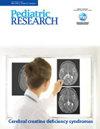儿童动物模型的科学、信仰和信念。
IF 3.1
3区 医学
Q1 PEDIATRICS
引用次数: 0
摘要
影响声明:抗生素治疗可能会影响肠道微生物群的发育,对肠道和其他内脏器官(如肺)的免疫反应产生不利影响。动物模型有助于揭示抗生素治疗的机制和后果,但将动物结果直接转化为婴儿和儿童通常是困难的。来自动物和人类研究的客观科学知识可能需要与更多的主观信念相结合,以达到普遍同意的信念,为临床实践提供信息。本文章由计算机程序翻译,如有差异,请以英文原文为准。
Science, faith and belief in pediatric animal models.
Impact statement: Antibiotic treatment may affect gut microbiota development with adverse effects on immune responses in the gut and other internal organs, like the lung. Animal models help to uncover mechanisms and consequences of antibiotic treatment, but direct translation of animal results to infants and children is often difficult. Objective scientific knowledge from both animal and human studies may need to be combined with more subjective faith convictions, to reach the commonly agreed beliefs that inform clinical practice.
求助全文
通过发布文献求助,成功后即可免费获取论文全文。
去求助
来源期刊

Pediatric Research
医学-小儿科
CiteScore
6.80
自引率
5.60%
发文量
473
审稿时长
3-8 weeks
期刊介绍:
Pediatric Research publishes original papers, invited reviews, and commentaries on the etiologies of children''s diseases and
disorders of development, extending from molecular biology to epidemiology. Use of model organisms and in vitro techniques
relevant to developmental biology and medicine are acceptable, as are translational human studies
 求助内容:
求助内容: 应助结果提醒方式:
应助结果提醒方式:


